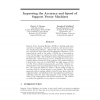Free Online Productivity Tools
i2Speak
i2Symbol
i2OCR
iTex2Img
iWeb2Print
iWeb2Shot
i2Type
iPdf2Split
iPdf2Merge
i2Bopomofo
i2Arabic
i2Style
i2Image
i2PDF
iLatex2Rtf
Sci2ools
116
click to vote
NIPS
1996
1996
Improving the Accuracy and Speed of Support Vector Machines
Support Vector Learning Machines (SVM) are nding application in pattern recognition, regression estimation, and operator inversion for ill-posed problems. Against this very general backdrop, any methods for improving the generalization performance, or for improving the speed in test phase, of SVMs are of increasing interest. In this paper we combine two such techniques on a pattern recognition problem. The method for improvinggeneralization performance (the \virtual support vector" method) does so by incorporating known invariances of the problem. This method achieves
Related Content
| Added | 02 Nov 2010 |
| Updated | 02 Nov 2010 |
| Type | Conference |
| Year | 1996 |
| Where | NIPS |
| Authors | Christopher J. C. Burges, Bernhard Schölkopf |
Comments (0)

